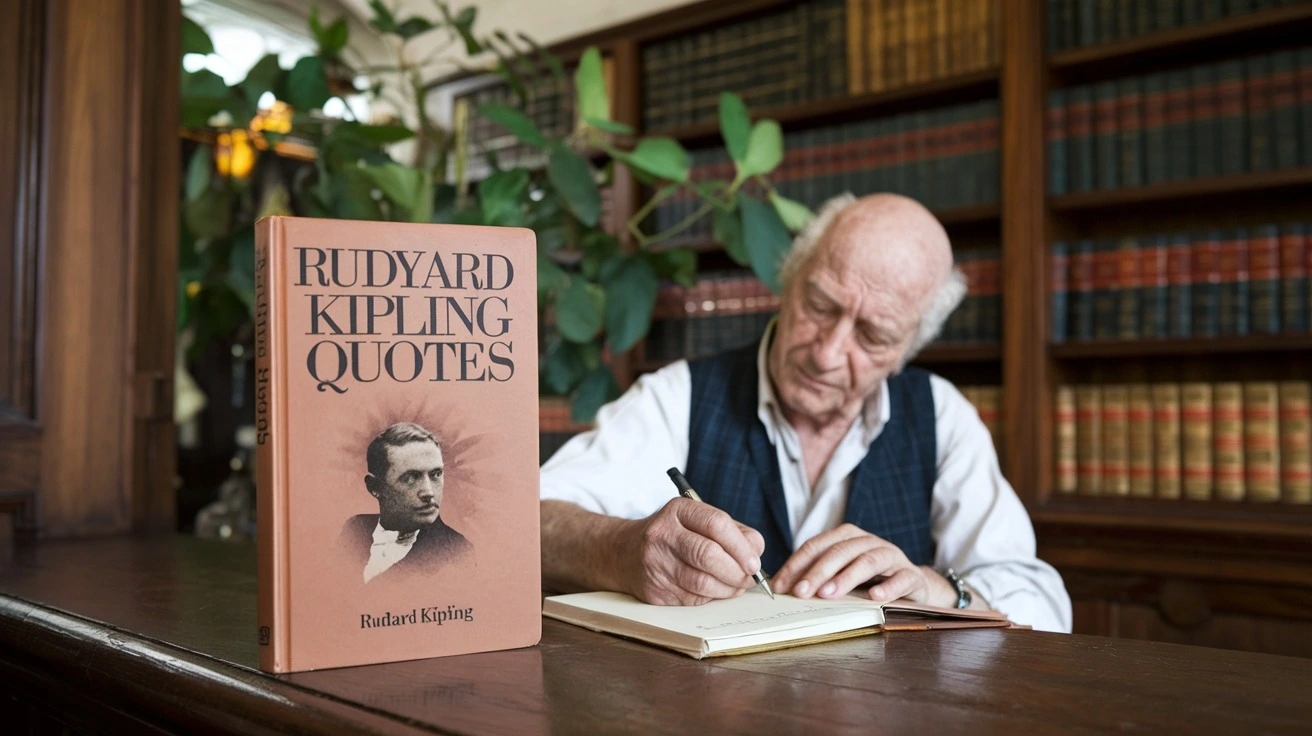In this blog post, we’ll explore some of the most memorable Rudyard Kipling Quotes, grouped under different themes that capture the essence of his thought-provoking words.
An English author and poet, Rudyard Kipling is best known for his timeless works like “The Jungle Book” and “Kim.”
His writings often reflect his deep understanding of human nature, society, and the complexities of life.
On Courage and Resilience
“If you can keep your head when all about you are losing theirs and blaming it on you…”
Author: Rudyard Kipling
Description:
This quote from Kipling’s poem “If—” speaks to the strength of character needed to remain calm and composed when surrounded by chaos. It’s a reminder that true courage lies in maintaining inner peace despite external turmoil.
“Gardens are not made by singing ‘Oh, how beautiful,’ and sitting in the shade.”
Author: Rudyard Kipling
Description:
This quote emphasizes the importance of hard work and perseverance. It suggests that achievements require effort and dedication, not admiration or wishful thinking.
“He travels the fastest who travels alone.”
Author: Rudyard Kipling
Description:
Kipling highlights the idea that independence can lead to quicker progress. However, it also hints at the potential loneliness that comes with solitary pursuits.
“Of all the liars in the world, sometimes the worst are our fears.”
Author: Rudyard Kipling
Description:
This quote is a powerful reminder that fear can distort reality and hold us back. Kipling encourages us to confront our fears rather than let them dictate our actions.
“You must learn to forgive a man when he’s in love. He’s always in the right.”
Author: Rudyard Kipling
Description:
Here, Kipling reflects on the irrationality often associated with love. It humorously suggests that love can cloud judgment, making it essential to be forgiving.
“A woman is only a woman, but a good cigar is a smoke.”
Author: Rudyard Kipling
Description:
This quote, though controversial, reflects the era’s gender norms and Kipling’s playful comparison between simple pleasures and relationships.
“Words are, of course, the most powerful drug used by mankind.”
Author: Rudyard Kipling
Description:
Kipling likens words to a drug, emphasizing their ability to influence, inspire, and sometimes harm. This quote underscores the importance of using language carefully.
“For the strength of the Pack is the Wolf, and the strength of the Wolf is the Pack.”
Author: Rudyard Kipling
Description:
Taken from “The Jungle Book,” this quote highlights the mutual dependence between an individual and their community. It speaks to the power of unity and teamwork.
“Never look backward or you’ll fall down the stairs.”
Author: Rudyard Kipling
Description:
This quote advises against dwelling on the past, suggesting that focusing too much on what’s behind us can hinder our progress and cause setbacks.
“Fill the unforgiving minute with sixty seconds’ worth of distance run.”
Author: Rudyard Kipling
Description:
Another line from “If—,” this quote encourages us to make the most of every moment. Kipling urges us to be relentless in our efforts, using time wisely to achieve our goals.
On Leadership and Responsibility
“The individual has always had to struggle to keep from being overwhelmed by the tribe.”
Author: Rudyard Kipling
Description:
Kipling points out the tension between individualism and conformity. It speaks to the courage required to maintain one’s identity and principles in the face of societal pressure.
“You’re a better man than I am, Gunga Din!”
Author: Rudyard Kipling
Description:
This famous line from Kipling’s poem “Gunga Din” highlights the importance of humility and recognizing the worth of others, regardless of their social status.
“The first condition of understanding a foreign country is to smell it.”
Author: Rudyard Kipling
Description:
Kipling emphasizes the need for immersive experiences to truly understand different cultures. This quote suggests that superficial knowledge is insufficient for genuine understanding.
“Take everything you like seriously, except yourselves.”
Author: Rudyard Kipling
Description:
Kipling encourages a balanced approach to life, where passions are pursued with dedication, but personal ego is kept in check. It’s a call to maintain perspective and humility.
“A man can never have too much red wine, too many books, or too much ammunition.”
Author: Rudyard Kipling
Description:
This quote reflects Kipling’s view on the essentials of life—pleasures, knowledge, and preparedness. It humorously combines these elements, suggesting a life well-equipped for all situations.
“And what should they know of England who only England know?”
Author: Rudyard Kipling
Description:
Kipling questions the narrow-mindedness of those who have only experienced their own culture. He implies that a broader understanding of the world is necessary for true wisdom.
“All the people like us are We and everyone else is They.”
Author: Rudyard Kipling
Description:
This quote highlights the human tendency to divide the world into ‘us’ and ‘them.’ It reflects on the tribalism and exclusion that often arise from such thinking.
“A man who lets himself be bored is even more contemptible than the bore.”
Author: Rudyard Kipling
Description:
Kipling criticizes those who passively allow boredom to take over, suggesting that it reflects a lack of imagination and engagement with life.
“If history were taught in the form of stories, it would never be forgotten.”
Author: Rudyard Kipling
Description:
Kipling emphasizes the power of storytelling in education. He suggests that history, when conveyed as engaging narratives, becomes more memorable and impactful.
“We have forty million reasons for failure, but not a single excuse.”
Author: Rudyard Kipling
Description:
This quote addresses the human tendency to rationalize failure. Kipling challenges us to take responsibility for our actions, rather than making excuses.
On Wisdom and Knowledge
“The world is very lovely, and it’s very horrible—and it doesn’t care about your life or mine or anything else.”
Author: Rudyard Kipling
Description:
This quote reflects Kipling’s understanding of the indifferent nature of the world. It reminds us that life’s beauty and cruelty are simply part of the larger, impersonal universe.
“We’re all islands shouting lies to each other across seas of misunderstanding.”
Author: Rudyard Kipling
Description:
This quote explores the challenges of communication and the isolation that often results from it. Kipling paints a picture of a world where people struggle to truly connect.
“The jungle is large, and the cub is small. Let him think and be still.”
Author: Rudyard Kipling
Description:
From “The Jungle Book,” this quote emphasizes the importance of contemplation and patience. It suggests that in the face of challenges, thinking before acting is crucial.
“The road to wisdom? Well, it’s plain and simple to express: Err and err and err again, but less and less and less.”
Author: Rudyard Kipling
Description:
Kipling captures the essence of learning through experience. This quote reminds us that wisdom comes from making mistakes and gradually improving.
“Never a noble aim perished for want of achievement.”
Author: Rudyard Kipling
Description:
This quote speaks to the enduring nature of noble goals, suggesting that the pursuit of greatness carries its value, even if success isn’t immediately achieved.
“He who can reach a child’s heart can reach the world’s heart.”
Author: Rudyard Kipling
Description:
Kipling emphasizes the profound impact of influencing young minds. This quote suggests that by nurturing and educating children, one can shape the future of the world.
“The female of the species is more deadly than the male.”
Author: Rudyard Kipling
Description:
This line from Kipling’s poem “The Female of the Species” suggests that women, when provoked, can be more dangerous than men. It’s a reflection on the strength and fierceness of women.
“The first condition of understanding a foreign country is to smell it.”
Author: Rudyard Kipling
Description:
Kipling underscores the importance of sensory experience in truly understanding a new culture. It suggests that surface-level knowledge isn’t enough for genuine insight.
“A woman’s guess is much more accurate than a man’s certainty.”
Author: Rudyard Kipling
Description:
This quote humorously highlights the intuitive nature of women. Kipling suggests that intuition can often surpass even the most confident reasoning.
“All we have of freedom—all we use or know—this our fathers bought for us, long and long ago.”
Author: Rudyard Kipling
Description:
Kipling reflects on the legacy of freedom passed down through generations. This quote honors the sacrifices made by those who came before us to secure our liberties.
On Identity and Self-Discovery
“What do they know of England who only England know?”
Author: Rudyard Kipling
Description:
This quote questions the understanding of one’s own identity without exposure to the broader world. Kipling suggests that knowing only one’s homeland can lead to a limited perspective.
“For the sin they do by two and two they must pay for one by one.”
Author: Rudyard Kipling
Description:
This line from “Tomlinson” speaks to personal accountability. Kipling suggests that, in the end, individuals must face the consequences of their actions alone.
“A man can never have too much red wine, too many books, or too much ammunition.”
Author: Rudyard Kipling
Description:
Kipling humorously suggests that some things are essential to a well-rounded life, blending pleasure, knowledge, and preparedness in this quote.
“If you can dream—and not make dreams your master…”
Author: Rudyard Kipling
Description:
From “If—,” this quote advises balance in life, encouraging the pursuit of dreams without being controlled by them. It’s about staying grounded while aspiring high.
“If you can think—and not make thoughts your aim…”
Author: Rudyard Kipling
Description:
Another line from “If—,” this quote urges thoughtful reflection without becoming lost in overthinking. Kipling promotes active engagement with the world alongside introspection.
“Keep your head when all about you are losing theirs and blaming it on you.”
Author: Rudyard Kipling
Description:
This quote from “If—” encourages maintaining composure and integrity under pressure, highlighting the strength of self-control in chaotic situations.
“Oh, East is East, and West is West, and never the twain shall meet.”
Author: Rudyard Kipling
Description:
From “The Ballad of East and West,” this quote reflects on the cultural divide between East and West. Kipling notes the deep-seated differences that often separate civilizations.
“When ‘Omer smote ‘is bloomin’ lyre, He’d ‘heard men sing by land and sea; An’ what he thought ‘e might require, ‘E went and took—the same as me!”
Author: Rudyard Kipling
Description:
This quote from “The Seven Seas” humorously highlights the notion of taking inspiration from others. Kipling suggests that creativity often involves borrowing and adapting ideas.
“A servant when he reigneth throws the blame on someone else.”
Author: Rudyard Kipling
Description:
Kipling critiques those who, when given power, shirk responsibility by passing the blame. This quote reflects on human nature and the misuse of authority.
“If you can fill the unforgiving minute with sixty seconds’ worth of distance run…”
Author: Rudyard Kipling
Description:
Another powerful line from “If—,” this quote emphasizes the importance of making the most of every moment. Kipling advocates for relentless effort and living life to the fullest.
On Friendship and Loyalty
“For the strength of the Pack is the Wolf, and the strength of the Wolf is the Pack.”
Author: Rudyard Kipling
Description:
This quote from “The Jungle Book” highlights the importance of community and teamwork. Kipling suggests that individuals and groups are mutually dependent on one another for strength.
“Never look backward or you’ll fall down the stairs.”
Author: Rudyard Kipling
Description:
Kipling advises focusing on the present and future rather than dwelling on the past. This quote is about keeping one’s eyes forward to avoid setbacks.
“A friend in need is a friend indeed.”
Author: Rudyard Kipling
Description:
This classic saying, often attributed to Kipling, emphasizes the value of true friendship. It suggests that a friend who stands by you in difficult times is a genuine ally.
“If you can walk with Kings—nor lose the common touch…”
Author: Rudyard Kipling
Description:
From “If—,” this quote encourages humility and balance, suggesting that one should remain grounded and approachable, regardless of status or success.
“For it was a woman that taught me to speak and a man that taught me to be silent.”
Author: Rudyard Kipling
Description:
This quote reflects on the different influences in life, suggesting that both communication and restraint are important lessons learned from others.
“When you can’t tell the truth about a thing, you must lie about it. It’s the only thing to do.”
Author: Rudyard Kipling
Description:
Kipling comments on the complexity of honesty, suggesting that sometimes, when truth is too difficult to convey, a lie might be necessary to navigate a situation.
“He travels the fastest who travels alone.”
Author: Rudyard Kipling
Description:
While this quote suggests that independence can lead to quicker progress, it also implies that such a journey might come at the cost of companionship and shared experiences.
“There is no sin so great as ignorance. Remember this.”
Author: Rudyard Kipling
Description:
Kipling emphasizes the importance of knowledge and awareness, suggesting that ignorance is a serious failing, especially in matters that require understanding and compassion.
“If you can meet with Triumph and Disaster and treat those two impostors just the same…”
Author: Rudyard Kipling
Description:
From “If—,” this quote encourages equanimity in the face of both success and failure. Kipling advises treating both with the same level of calmness and perspective.
“The law of the jungle is as old and as true as the sky.”
Author: Rudyard Kipling
Description:
This quote from “The Jungle Book” speaks to the timeless and unchanging nature of certain fundamental truths. Kipling likens these enduring principles to the natural laws of the wild.
On Adventure and Exploration
“The road is long if one proceeds by way of the precepts but short and effectual if one follows by way of examples.”
Author: Rudyard Kipling
Description:
Kipling suggests that learning from real-life examples is often more effective than merely following theoretical guidelines. This quote reflects on the value of practical experience in life’s journey.
“If you don’t get what you want, it’s a sign either that you did not seriously want it, or that you tried to bargain over the price.”
Author: Rudyard Kipling
Description:
This quote reflects on the nature of desire and effort. Kipling suggests that true commitment to a goal requires both a clear vision and a willingness to pay the necessary price.
“The jungle is large, and the cub is small. Let him think and be still.”
Author: Rudyard Kipling
Description:
In “The Jungle Book,” this quote emphasizes the importance of contemplation and patience. It suggests that in the face of challenges, thinking before acting is crucial.
“Oh, East is East, and West is West, and never the twain shall meet.”
Author: Rudyard Kipling
Description:
From “The Ballad of East and West,” this quote reflects on the cultural divide between East and West. Kipling notes the deep-seated differences that often separate civilizations.
“For the sin they do by two and two they must pay for one by one.”
Author: Rudyard Kipling
Description:
This line from “Tomlinson” speaks to personal accountability. Kipling suggests that, in the end, individuals must face the consequences of their actions alone.
“If you can dream—and not make dreams your master…”
Author: Rudyard Kipling
Description:
From “If—,” this quote advises balance in life, encouraging the pursuit of dreams without being controlled by them. It’s about staying grounded while aspiring high.
“A man’s mind is wont to tell him more than seven watchmen sitting in a tower.”
Author: Rudyard Kipling
Description:
This quote reflects on the power of intuition and inner wisdom. Kipling suggests that one’s thoughts and instincts can be more insightful than external advice or observation.
“Take everything you like seriously, except yourselves.”
Author: Rudyard Kipling
Kipling encourages a balanced approach to life, where passions are pursued with dedication, but personal ego is kept in check. It’s a call to maintain perspective and humility.
“He travels the fastest who travels alone.”
Author: Rudyard Kipling
Description:
While this quote suggests that independence can lead to quicker progress, it also implies that such a journey might come at the cost of companionship and shared experiences.
“Fill the unforgiving minute with sixty seconds’ worth of distance run.”
Author: Rudyard Kipling
Description:
Another line from “If—,” this quote encourages us to make the most of every moment. Kipling urges us to be relentless in our efforts, using time wisely to achieve our goals.
On War and Conflict
“If you can keep your head when all about you are losing theirs and blaming it on you…”
Author: Rudyard Kipling
Description:
This quote from Kipling’s poem “If—” speaks to the strength of character needed to remain calm and composed when surrounded by chaos. It’s a reminder that true courage lies in maintaining inner peace despite external turmoil.
“When you’re wounded and left on Afghanistan’s plains, and the women come out to cut up what remains, jest roll to your rifle and blow out your brains.”
Author: Rudyard Kipling
Description:
This dark and graphic quote from “The Young British Soldier” reflects the brutal realities of war. Kipling’s words convey the harshness of combat and the dire situations soldiers might face.
“The tumult and the shouting dies, the captains and the kings depart.”
Author: Rudyard Kipling
Description:
In Kipling’s poem “Recessional,” this quote reflects on the fleeting nature of power and glory, particularly after a conflict. It’s a reminder of the impermanence of worldly achievements.
“For it’s Tommy this, an’ Tommy that, an’ ‘Chuck him out, the brute!’ But it’s ‘Savior of ‘is country’ when the guns begin to shoot.”
Author: Rudyard Kipling
Description:
In Kipling’s poem “Tommy,” this quote highlights the double standards soldiers face—dismissed in peace but hailed as heroes in war. It’s a critique of society’s treatment of its military.
“When ‘Omer smote ‘is bloomin’ lyre, He’d ‘read men sing by land and sea; An’ what he thought ‘e might require, ‘E went and took—the same as me!”
Author: Rudyard Kipling
Description:
This quote from “The Seven Seas” humorously highlights the notion of taking inspiration from others. Kipling suggests that creativity often involves borrowing and adapting ideas.
“If any question why we died, tell them because our fathers lied.”
Author: Rudyard Kipling
Description:
Kipling reflects on the tragic consequences of war, particularly the generational impact of conflicts fueled by past mistakes or deceptions. It’s a poignant commentary on the cycle of violence.
“For the sin they do by two and two they must pay for one by one.”
Author: Rudyard Kipling
Description:
This line from “Tomlinson” speaks to personal accountability. Kipling suggests that, in the end, individuals must face the consequences of their actions alone.
“When you can’t tell the truth about a thing, you must lie about it. It’s the only thing to do.”
Author: Rudyard Kipling
Description:
Kipling comments on the complexity of honesty, suggesting that sometimes, when truth is too difficult to convey, a lie might be necessary to navigate a situation.
“The female of the species is more deadly than the male.”
Author: Rudyard Kipling
Description:
This line from Kipling’s poem “The Female of the Species” suggests that women, when provoked, can be more dangerous than men. It’s a reflection on the strength and fierceness of women.
“The law of the jungle is as old and as true as the sky.”
Author: Rudyard Kipling
Description:
This quote from “The Jungle Book” speaks to the timeless and unchanging nature of certain fundamental truths. Kipling likens these enduring principles to the natural laws of the wild.
On Faith and Belief
“The more you know yourself, the more you will forgive others.”
Author: Rudyard Kipling
Description:
Kipling suggests that self-awareness fosters empathy and understanding toward others. This quote highlights the connection between inner knowledge and forgiveness.
“Never look backward or you’ll fall down the stairs.”
Author: Rudyard Kipling
Description:
Kipling advises against dwelling on the past, suggesting that focusing too much on what’s behind us can hinder our progress and cause setbacks.
“The world is very lovely, and it’s very horrible—and it doesn’t care about your life or mine or anything else.”
Author: Rudyard Kipling
Description:
This quote reflects Kipling’s understanding of the indifferent nature of the world. It reminds us that life’s beauty and cruelty are simply part of the larger, impersonal universe.
“If you can meet with Triumph and Disaster and treat those two impostors just the same…”
Author: Rudyard Kipling
Description:
From “If—,” this quote encourages a balanced perspective on life’s ups and downs. Kipling advises us to remain steady and composed, regardless of success or failure.
“An ounce of mother is worth a pound of clergy.”
Author: Rudyard Kipling
Description:
Kipling highlights the irreplaceable value of maternal care and wisdom. This quote suggests that a mother’s influence can often surpass that of formal religious guidance.
“A nation’s strength is not in the splendor of its wealth, but in the character of its people.”
Author: Rudyard Kipling
Description:
Kipling highlights the importance of moral integrity and character over material wealth. This quote suggests that a nation’s true power lies in the values of its citizens.
“If you don’t get what you want, it’s a sign either that you did not seriously want it, or that you tried to bargain over the price.”
Author: Rudyard Kipling
Description:
Kipling’s words reflect the nature of desire and effort. He suggests that true commitment to a goal requires both a clear vision and a willingness to pay the necessary price.
“The first condition of understanding a foreign country is to smell it.”
Author: Rudyard Kipling
Description:
Kipling emphasizes the need for immersive experiences to truly understand different cultures. This quote suggests that superficial knowledge is insufficient for genuine understanding.
“Take everything you like seriously, except yourselves.”
Author: Rudyard Kipling
Description:
Kipling encourages a balanced approach to life, where passions are pursued with dedication, but personal ego is kept in check. It’s a call to maintain perspective and humility.
“Fill the unforgiving minute with sixty seconds’ worth of distance run.”
Author: Rudyard Kipling
Description:
Another line from “If—,” this quote encourages us to make the most of every moment. Kipling urges us to be relentless in our efforts, using time wisely to achieve our goals.
On Society and Humanity
“All the people like us are We and everyone else is They.”
Author: Rudyard Kipling
Description:
This quote highlights the human tendency to divide the world into ‘us’ and ‘them.’ It reflects on the tribalism and exclusion that often arise from such thinking.
“For the sin they do by two and two they must pay for one by one.”
Author: Rudyard Kipling
Description:
This line from “Tomlinson” speaks to personal accountability. Kipling suggests that, in the end, individuals must face the consequences of their actions alone.
“A woman is only a woman, but a good cigar is a smoke.”
Author: Rudyard Kipling
Description:
This quote, though controversial, reflects the era’s gender norms and Kipling’s playful comparison between simple pleasures and relationships.
“The jungle is large, and the cub is small. Let him think and be still.”
Author: Rudyard Kipling
Description:
In “The Jungle Book,” this quote emphasizes the importance of contemplation and patience. It suggests that in the face of challenges, thinking before acting is crucial.
“If you can dream—and not make dreams your master…”
Author: Rudyard Kipling
Description:
From “If—,” this quote advises balance in life, encouraging the pursuit of dreams without being controlled by them. It’s about staying grounded while aspiring high.
“We’re all islands shouting lies to each other across seas of misunderstanding.”
Author: Rudyard Kipling
Description:
This quote explores the challenges of communication and the isolation that often results from it. Kipling paints a picture of a world where people struggle to truly connect.
“He who can reach a child’s heart can reach the world’s heart.”
Author: Rudyard Kipling
Description:
Kipling emphasizes the profound impact of influencing young minds. This quote suggests that by nurturing and educating children, one can shape the future of the world.
“If you can think—and not make thoughts your aim…”
Author: Rudyard Kipling
Description:
Another line from “If—,” this quote urges thoughtful reflection without becoming lost in overthinking. Kipling promotes active engagement with the world alongside introspection.
“A servant when he reigneth throws the blame on someone else.”
Author: Rudyard Kipling
Description:
Kipling critiques those who, when given power, shirk responsibility by passing the blame. This quote reflects on human nature and the misuse of authority.
“If you can walk with Kings—nor lose the common touch…”
Author: Rudyard Kipling
Description:
From “If—,” this quote encourages humility and balance, suggesting that one should remain grounded and approachable, regardless of status or success.
On Courage and Strength
“If you can keep your head when all about you are losing theirs and blaming it on you…”
Author: Rudyard Kipling
Description:
This quote from Kipling’s poem “If—” speaks to the strength of character needed to remain calm and composed when surrounded by chaos. It’s a reminder that true courage lies in maintaining inner peace despite external turmoil.
“Fill the unforgiving minute with sixty seconds’ worth of distance run.”
Author: Rudyard Kipling
Description:
Another line from “If—,” this quote encourages us to make the most of every moment. Kipling urges us to be relentless in our efforts, using time wisely to achieve our goals.
“For the strength of the Pack is the Wolf, and the strength of the Wolf is the Pack.”
Author: Rudyard Kipling
Description:
This quote from “The Jungle Book” highlights the importance of community and teamwork. Kipling suggests that individuals and groups are mutually dependent on one another for strength.
“He who can reach a child’s heart can reach the world’s heart.”
Author: Rudyard Kipling
Description:
Kipling emphasizes the profound impact of influencing young minds. This quote suggests that by nurturing and educating children, one can shape the future of the world.
“If you can meet with Triumph and Disaster and treat those two impostors just the same…”
Author: Rudyard Kipling
Description:
From “If—,” this quote encourages equanimity in the face of both success and failure. Kipling advises treating both with the same level of calmness and perspective.
“A nation’s strength is not in the splendor of its wealth, but in the character of its people.”
Author: Rudyard Kipling
Description:
Kipling highlights the importance of moral integrity and character over material wealth. This quote suggests that a nation’s true power lies in the values of its citizens.
“Keep your head when all about you are losing theirs and blaming it on you.”
Author: Rudyard Kipling
Description:
This quote from “If—” encourages maintaining composure and integrity under pressure, highlighting the strength of self-control in chaotic situations.
“The law of the jungle is as old and as true as the sky.”
Author: Rudyard Kipling
Description:
This quote from “The Jungle Book” speaks to the timeless and unchanging nature of certain fundamental truths. Kipling likens these enduring principles to the natural laws of the wild.
“Take everything you like seriously, except yourselves.”
Author: Rudyard Kipling
Description:
Kipling encourages a balanced approach to life, where passions are pursued with dedication, but personal ego is kept in check. It’s a call to maintain perspective and humility.
“He travels the fastest who travels alone.”
Author: Rudyard Kipling
Description:
While this quote suggests that independence can lead to quicker progress, it also implies that such a journey might come at the cost of companionship and shared experiences.










